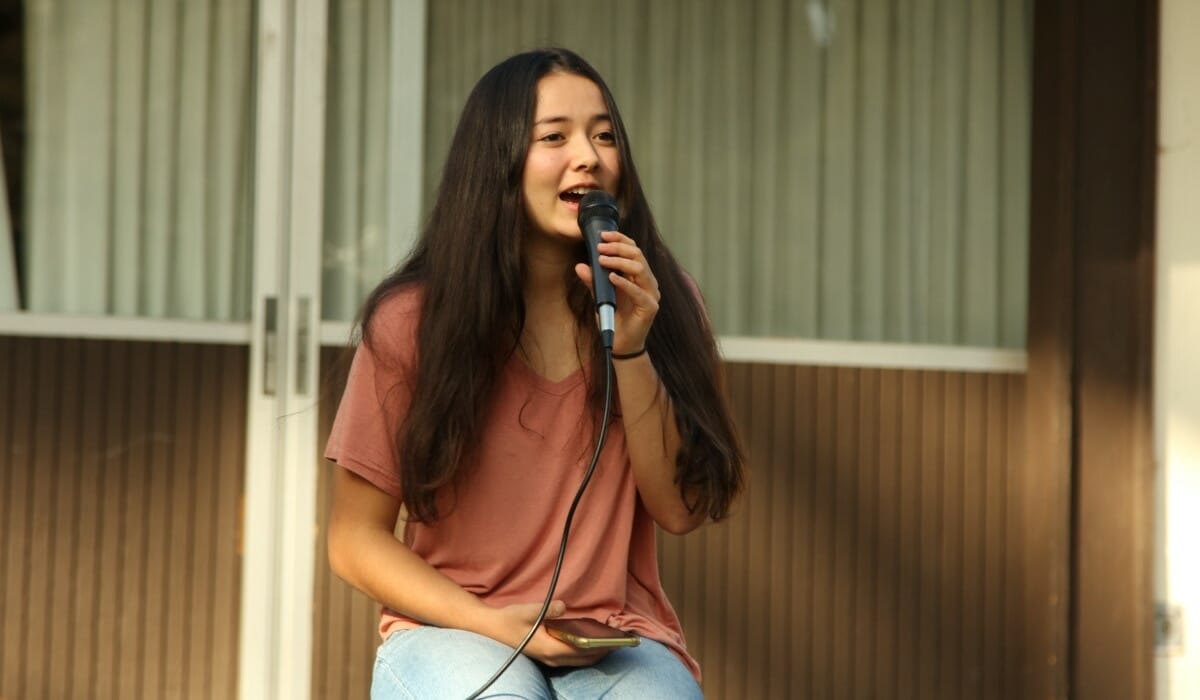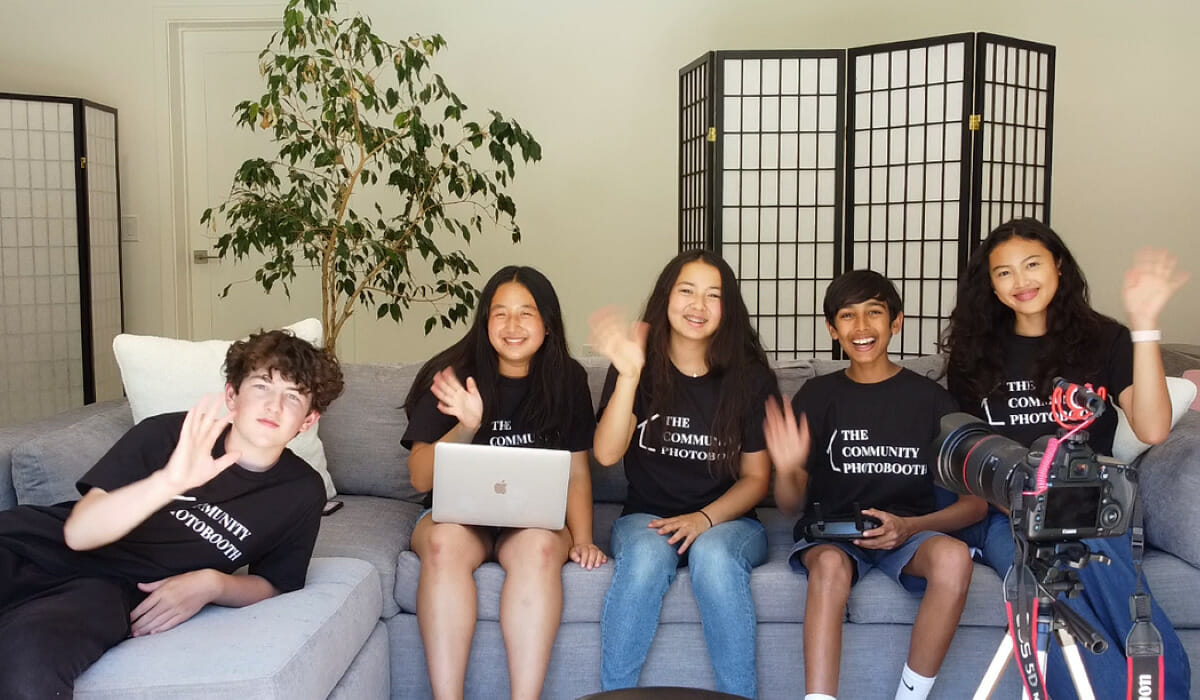Turning Great Loss into Effective Action: A Story of Resilience, Art and Community

Meet Daily Point of Light Award honoree Charlotte Rosario. Read her story and nominate an outstanding volunteer or family as a Daily Point of Light.
Content Warning: Points of Light is proud to share the following uplifting and inspiring story. However, we acknowledge that a portion mentions suicide and may be difficult for some readers. We encourage you to please care for your own well-being above all.
When Charlotte Rosario was just 12 years old, she lost her dad to suicide. Her family was already devastated when, shortly after, the rest of the world came to a grinding halt with COVID lockdowns. What was already a difficult time led to even more challenges.
“My dad, reflecting back on his life, was disconnected in many ways from our community and didn’t get much support,” Charlotte, now a rising high school junior, says.
Unsure of how to spend her days at home, she stumbled upon her family’s old Nikon D60 camera and started taking it — and her dog, Kipper — on walks around the community. She’d even venture into San Francisco to take pictures of people and places, meeting new neighbors along the way. It was her enjoyment of photography and the need to channel her grief into action that led her to found The Community Photobooth later that year.
“After my dad’s death, my family — my mom especially — taught me the importance of healing by helping others. That’s the guiding principle of how I live my life now,” Charlotte shares.
The organization utilizes teen photographers to host family photoshoots or to cover events around Northern California in order to raise funds for people who don’t receive much support or recognition for the community work they’re doing. They also raise awareness of the importance of mental health. While it was initially supporting local hospitals and food banks impacted by the pandemic, it has since expanded its reach.
The group spends a lot of time researching potential recipients before deciding who will be the subject of their fundraisers. One such person was Ukrainian photographer, Julia Kotchetova, who is working independently to document the war in her country.
“We worked with her to raise funds to help support her efforts and purchase protective equipment for her so that when she’s going out into the battlefields, she’s protected,” Charlotte adds.
As for her part, Charlotte oversees 12 photographers, each with their own “photobooth” where people can book shoots. Much of her work is coordinating events and creating an overarching strategy for the organization.
“It feels like family, and it really warms my heart to know that The Community Photobooth is helping unite teens in a shared mission of highlighting and supporting invisible needs,” she says.

“We’ve since really grown the program and our funding, but when she came to us, that funding was crucial to us re-launching. Since she raised that money, we touched over 2,500 high schoolers in that year alone,” explains Leslie Davis, interim Executive Director of NAMI during that period and Charlotte’s current mentor.
Due to the success of Ending the Silence, NAMI has been able to form youth support groups for high schoolers and college students. Charlotte, who also volunteers with NAMI, will be leading their new Youth Advisory Committee, a group that ensures the umbrella organization knows what students need without making assumptions.
“The great thing about Charlotte is that anyone who works with her, especially other students that may not be as savvy in different areas as she is, she brings along. She mentors so many people,” Leslie adds.
Last year, Charlotte’s passion for ending the stigma around mental health and building community led to another project, a documentary called It’s Time We Talk About It, that she wrote and directed. It was inspired by Katie Meyer, a Stanford women’s soccer team captain who took her life in March of 2022.
“I remember hearing about her passing on the news and turning to my mom, telling her that I couldn’t keep our story in any longer,” Charlotte recalls. “My family was not comfortable talking about our situation for many years following my dad’s death. And so, in the last year or two, it’s been really transformative, because I’ve finally been able to come forward about my story, and the documentary was the big way that I did that.”
In the film, three young adults including Katie Meyers’ teammate, a member of the LGBTQ+ community and Charlotte speak about their experiences surrounding suicide. It has garnered national media attention and has been adopted as an educational resource by organizations like CASSY Bay Area and The Health Care Collective.
“The documentary has been really a powerful and effective way of sharing all these stories all around the country, to have them be used as educational resources and to start conversations in families and schools,” Charlotte mentions.
In February of this year, she went into more detail about her story than ever before on a segment for CBS’s Kids in Crisis segment, feeling that being vulnerable with the population she was trying to support would make her a better advocate. Sharing was a big step in her healing process, and she was motivated to give others the chance to do the same. Last December, Charlotte hosted a community open mic night where she and others could talk about their experiences with mental illness and suicide, breaking the ever-present stigma along the way.
“The biggest thing I’ve learned through this whole experience that I hope to share with others is to take what really festers inside of you — the sadness, the grief, the anxiety or fear — whatever keeps you up at night, and use that as fuel to do something good in your community,” she suggests.
What began a tragedy has become a movement. Not only has Charlotte built a stronger, more caring community, but she touches people wherever she goes.
“She really cares about each person. She will make that person feel like they’re the only person in the room and the only person that exists. And she will truly get to know them,” Leslie says. “If there’s an anniversary or something coming up, she’ll remember things like that. And she always gives the extra effort.”
“Getting through the last few years was very tough, and I think knowing that my dad did not have a robust community support system really drove me to build that community, not only for others, but in many ways, for myself,” Charlotte says.
This year, she and The Community Photobooth look forward to supporting a group in Kenya that helps young refugees get off the streets by teaching them photography as well as Battle Osteosarcoma, an organization that promotes the research of a cancer that has sadly taken multiple members of the local community.
“Charlotte has been through a lot, and she’s the most resilient, incredibly brilliant, high schooler that I’ve seen in years, and I’ve hired thousands of high schoolers over my nonprofit career,” Leslie states.
“I’m just really grateful for all the people that have been a part of this mission,” Charlotte reflects. “Going forward, I hope I can continue to support my community, and I hope that more people will do the same.”
If you or someone you know may be considering suicide, contact the National Suicide Prevention Lifeline at 1-800-273-8255, or text HOME to 741741 to talk to a trained crisis counselor through Crisis Text Line. Both resources are anonymous, free and available 24/7.
Do you want to make a difference in your community like Charlotte? Find local volunteer opportunities.